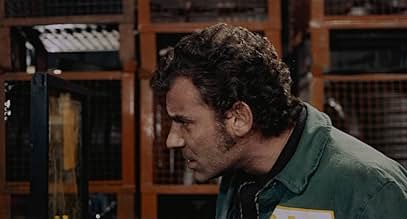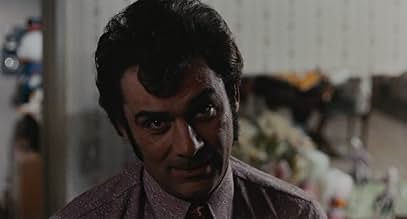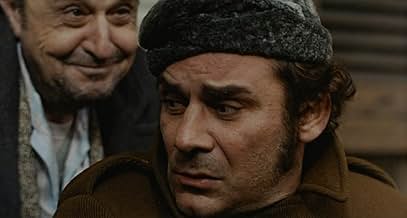IMDb RATING
7.6/10
4.3K
YOUR RATING
A conscientious factory worker becomes embroiled in political activism after accidentally cutting off his finger while working a machine.A conscientious factory worker becomes embroiled in political activism after accidentally cutting off his finger while working a machine.A conscientious factory worker becomes embroiled in political activism after accidentally cutting off his finger while working a machine.
- Awards
- 7 wins & 4 nominations
Nino Bignamini
- Salvatore Quaranta
- (as Giovanni Bignamini)
- Director
- Writers
- All cast & crew
- Production, box office & more at IMDbPro
Storyline
Did you know
- TriviaElio Petri's "La classe operaia va in paradiso" shows a very subtle cameo of Ennio Morricone, who also composed the original score of this film, awarded with a Palme d'or in the 1972 Cannes Film Festival. The Italian Maestro appears in close-up for almost one minute as the anonymous--and obviously uncredited--blue-collar who actions the cart, with both hands up and down, at the end of the assembly line in the factory. His repeated gesture immediately activates the "mechanical" music that announces the end titles.
- Quotes
Lulù Massa: If you want my food, take it. I'm not hungry, I've a rift in my stomach.
- ConnectionsFeatured in Italian Gangsters (2015)
Featured review
The Spirit of Social Justice of the May '68 uprisings is still very much alive in this heavy-going but compelling parable of the rise and fall in the fortunes of an Italian factory worker dubbed Lulu (Gian Maria Volonte'): starting out as the Boss' darling for being the exemplary employee and pacesetter of the company, the loathing of his co-workers (who despise him for how his excessive zeal makes their own lackluster performance look bad in the eyes of the manager) and his female companion Mariangela Melato (who never gets any piece of the action at night because of his constant fatigue) eventually gets to him one day with the result that he loses his concentration at work and suffers the loss of a finger in an accident. This changes his whole outlook on life as he becomes engrossed in an extremist workers' union, finally makes love in his car to a virginal female co-worker/union member he is obsessed with, is quitted by his consumerist hairdresser companion and his surrogate son and, when he is given the sack at work and is on the point of selling off his belongings, another more moderate workers' union comes to his aid by winning him his old job back. Although there is obviously much footage here of socio-political discussions, scenes of picketing and police riots, confrontations between diverse unions, etc., the film also has that winning whimsical streak promised by its title and exemplified by amusing episodes in a mental institution (where Volonte' visits his cracked-up ex-colleague Salvo Randone), the quasi-surreal sequence of Volonte' taking it out on all his useless possessions (including a giant inflatable doll of Scrooge McDuck!), and the concluding description at the assembly line of the titular incident itself which Volonte' had in a dream the previous night. Ennio Morricone's inventively 'metallic' music underscores the robotic gestures of the factory workers who, despite slaving eight hours a day at their machines, are not even aware what becomes of the parts they produce! While the film may seem overdone and dated in today's apathetic age, it clearly hit a nerve at the time of its release winning a handful of international awards including the Palme D'Or at the Cannes Film Festival.
- Bunuel1976
- Feb 2, 2009
- Permalink
- How long is The Working Class Goes to Heaven?Powered by Alexa
Details
- Runtime2 hours 5 minutes
- Sound mix
- Aspect ratio
- 1.85 : 1
Contribute to this page
Suggest an edit or add missing content

Top Gap
By what name was The Working Class Goes to Heaven (1971) officially released in Canada in English?
Answer



























